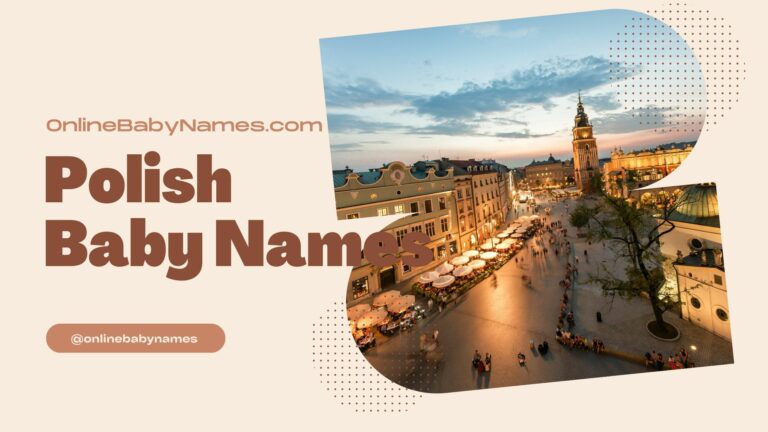
Choosing the perfect name for your baby can be an exciting yet daunting task. As a parent, you want a name that reflects your child’s personality, heritage, and holds a special meaning. If you’re of Polish descent or simply have a love for Polish culture, it’s worth considering Polish baby names for your little one. These names are not just beautiful and distinctive, but they also carry centuries of history and rich cultural significance.
Polish names typically have Slavic roots, and can be easily recognized by their distinct sounds and endings. Whether it’s a popular name like Katarzyna or a unique one like Władysław, these names are filled with charm, elegance, and tradition. Moreover, many Polish names have a knack for carrying deep meanings, like strength, love, and bravery, which can add an extra layer of personality to your child’s identity.
In this article, I’ll be exploring various popular and intriguing Polish baby names, delving into their meanings, origins, and cultural significance. You’ll discover a wide array of names to consider for your precious baby, and in the process, familiarize yourself with the rich linguistic and cultural heritage that Polish baby names embody. So, let’s embark on an exciting journey into the world of enchanting Polish names to help you find the perfect one for your child.
The Origins of Polish Baby Names
Polish baby names have a rich and diverse history, reflecting the country’s strong cultural ties and its language’s Slavic roots. Whether you’re considering a Polish name for your little one or simply have an interest in names, I’m here to help you understand their origins and meanings.
Polish names are typically derived from Slavic, Latin, Greek, and Hebrew sources. Many names have Christian origins, stemming from the influence of the Catholic Church in Poland. Over time, Polish names have evolved and adapted to various historical and cultural changes.
One important aspect of Polish names is their grammatical gender. Just like in the Polish language, each name has a masculine or feminine form. For example:
- Masculine: Jan (John)
- Feminine: Jana (Joan)
Let’s dive into the many components that make up Polish baby names:
Slavic origins
Polish names with Slavic roots often have strong meanings, closely related to nature or desirable traits. For instance:
- Czesław: derived from “czcić” (to honor) and “sława” (glory)
- Dobroslaw: composed of “dobry” (good) and “sława” (glory)
- Milena: originating from the word “miły” (kind, pleasant)
Latin, Greek, and Hebrew origins
Given the influence of Christianity in Poland’s history, many names are borrowed from the Latin, Greek, and Hebrew languages. Some examples include:
- Katarzyna (Catherine): originating from Greek “Aikaterina”
- Michał (Michael): derived from Hebrew “Micha’el”
- Mateusz (Matthew): based on the Latin “Matthaeus”
Diminutives
Polish names often have delightful and affectionate diminutives, serving as informal versions or terms of endearment. Some of these diminutives are more commonly used than the formal name itself. A few examples:
- Janusz (Jan) → Jasiek or Jasio
- Barbara (Basia) → Basieńka
- Alicja (Ala) → Alusia
Surnames
In addition to given names, Polish surnames are an essential part of one’s identity. Historically, Polish surnames were derived from several sources:
- Patronyms – based on the father’s given name
- Occupations
- Personal characteristics or nicknames
- Topographic features or place names
In conclusion, the origins of Polish baby names are intertwined with the country’s history, borrowing from its Slavic roots and the influences of Latin, Greek, and Hebrew languages. Each Polish name carries its unique meaning, connection to history, and a special affectionate diminutive.
Popular Polish Baby Names for Girls
When searching for the perfect name for your little girl, you might want to consider some popular Polish baby names. I’ve put together a list of some of the most popular choices for girls in recent times, reflecting the rich culture and history of Poland.
Amelia: This lovely name means “industrious” and “striving.” It’s not only popular in Poland but also in many other countries. Amelia has a classic, elegant feel that many parents adore.
Zuzanna: Often chosen for its beautiful meaning, “lily,” Zuzanna is a unique name in many English-speaking countries. It is a popular choice in Poland as it showcases their strong cultural ties.
Wiktoria: A popular name for girls in Poland, Wiktoria is the local version of the classic English name, Victoria. It means “victory,” making it a particularly strong and powerful name choice.
Maja: This short and sweet name translates directly to “May,” a month that symbolizes both beauty and rebirth. Maja has a timeless appeal and remains a popular choice in Poland today.
Here are a few other Polish girl names gaining popularity:
- Natalia: With strong ties to the Christmas season and meaning “birth,” Natalia is an elegant yet timeless choice for any baby girl.
- Oliwia: A beautiful variation of the classic name Olivia, Oliwia is often chosen for its association with peace and harmony.
- Aleksandra: A Polish take on the name Alexandra, Aleksandra means “defender” and “protector of mankind,” a powerful choice for any little girl.
Although trends change, some truly traditional Polish names have stood the test of time. Here are a few examples of classic, historical Polish baby girl names:
- Agata: Meaning “good” and “kind-hearted,” Agata has been a popular and beloved name in Polish communities for centuries.
- Katarzyna: Inspired by the Greek name Katherine, Katarzyna means “pure” and evokes the beauty and grace of its namesake.
- Krystyna: A Polish take on the name Christina, Krystyna means “anointed” and “follower of Christ.” This name carries a profound religious connection for many Polish families.
It’s important to keep in mind that naming customs can vary greatly depending on factors like culture, personal beliefs, and family traditions. I hope this list of popular Polish baby names for girls provides some inspiration for those looking to celebrate their Polish heritage or simply discover the unique beauty of these names.
Popular Polish Baby Names for Boys
I’m excited to share some popular Polish baby names for boys! As you probably know, baby names often reflect a country’s culture and history. In Poland, many names have a strong linkage to the country’s rich heritage, and parents often choose names that convey a connection to traditional Polish values.
In the following paragraphs, I will showcase some attention-grabbing baby names that are not only popular in Poland but also carry a deep cultural and traditional significance. So, without further ado, let’s dive into the world of Polish baby names for boys!
First, let me introduce you to three outstanding Polish baby names and their meanings:
- Jakub: A form of Jacob, meaning “supplanter” or “holder of the heel.”
- Antoni:















